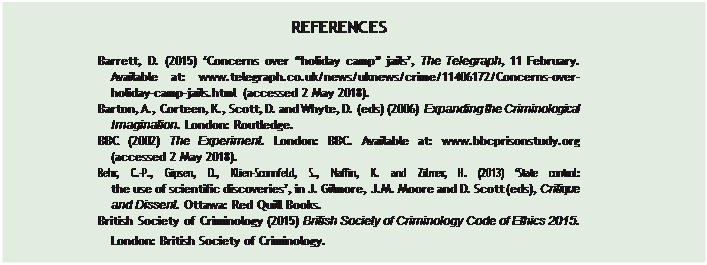 |
Summary and review
|
|
|
|
This chapter has argued that social research cannot be understood outside of the existing social divisions and power relations (Barton et al., 2007). It has
foregrounded the philosophical concepts of ontology and epistemology. In so doing it has drawn on research on suffering and death in the prison place, highlighting some of the ethical and political dilemmas that shape prison studies. The very different ontologies and epistemologies of liberal penal reformers and abolitionists have been highlighted, as well as how certain forms of critical knowledge can be sidelined or excluded because their epistemologies are inconsistent with the ontological assump- tions of those who fund research. Penal abolitionists argue that the ‘ontology’ of the prison place is fundamentally predicated on violence, exploitation, infringements of human dignity, unnecessary suffering and death. Thus, for abolitionist ‘epistemology’ it is important to draw on the experiences of prisoners, as well as prisoner families and prison staff, and to validate their knowledge and experience. For Sim et al. (1987), Scraton (2004) and Scott (2016b), it is only through (carefully and empa- thetically but critically) hearing the voice of prisoners that a full understanding of imprisonment can be achieved. It is not that we should always agree with the view from below, but that we should ensure that all voices are heard and acknowledged, even if they are later challenged and alternative viewpoints promoted.
Criminological research is not only shaped by political factors. Ethical consid-
erations are also important and quite rightly question the legitimacy of certain research practices that generate harm, such as the Stanford Prison Experiment. Exploring different ethical frameworks, it has been shown that, sometimes, the researcher’s own ontological assumptions need to be challenged by the world- views of people on the margins, to ensure that ethical duties and responsibilities are fully met. Further, for abolitionists the ethics and politics of social research are directly tied to ongoing social struggles against the harms of imprisonment, the repair of human injury and the building of non-penal radical alternatives grounded in the principles of social justice. There is then an interplay between ontological and epistemological assumptions that requires considerable reflection. This places considerations of ethics and politics at the heart of the research process. One major challenge of doing criminological research for both students and profes- sional researchers is finding a way of thinking about ontology and epistemology that can meet the ethico-political priorities and demands explored in this chapter.
 | |||
 | |||
 (Continued)
(Continued)
c. politicians
d. criminal justice agents
e. the main criminological perspectives that have explored this topic.
Think then about your own ontological assumptions and epistemological priorities. In what ways are they similar to or different from those of the above? In what ways have they changed (if any) since you started studying criminology?
|
|
|
2. Is it possible for social research to be simply about the ‘search for truth’? What are the possible obstacles that can be placed in the way of such a pursuit of value free and objective knowledge? How might some of those obstacles be overcome?
3. You are planning to undertake a research project in a prison. What are the ethical implications of your study and how would you ensure that you undertake the research in a way which complies with the four different ethical frameworks dis- cussed in this chapter? How would you aim to avoid some of the problems encountered by penal researchers discussed in this chapter?
4. Look up the ethical guidelines of one or more of the following:
¡ British Society of Criminology Statement of Ethics 2015 at www. britsoccrim. org/documents/BSCEthics2015. pdf
¡ Singapore Statement on Research Integrity at www. singaporestatement. org
¡ Belmont Report: Ethical Principles and Guidelines for the Protection of Human Subjects of Research at www. hhs. gov/ohrp/regulations-and-policy/belmont- report/index. html
¡ your university.
 Ask the lecturers (and PhD students) at your university about their experience of Research Ethics Boards. What kinds of issues have they encountered in the research? Have they been focused on research ethics or risk? Why would this dis- tinction between ethics and risk be important?
Ask the lecturers (and PhD students) at your university about their experience of Research Ethics Boards. What kinds of issues have they encountered in the research? Have they been focused on research ethics or risk? Why would this dis- tinction between ethics and risk be important?
 Research values are central to the ethics and politics of criminological research, and the websites of the BBC programme The Experiment (BBC, 2002) and the Stanford Prison Experiment (2017) provide detailed yet critical reflections on the ethical consequences of undertaking social psychological experiments on prison life. For a contrasting ethical framework regarding research values, see the statements of ethics by the British Society of Criminology (2015) and the Singapore Statement on Research Integrity (2010), both of which highlight the importance of following rules and guidelines when undertaking social research. One of the most influential criminological accounts of why research values mat- ter is ‘Talking about prison blues’ (Cohen and Taylor, 1977), which provides a candid and insightful discussion of the problems the authors encountered when undertaking research with high security prisoners in HMP Durham in the early 1970s. A more recent account drawing on ethnographic work, this time focused on research on prison officers to illustrate critical research values, is Scott (2015b).
Research values are central to the ethics and politics of criminological research, and the websites of the BBC programme The Experiment (BBC, 2002) and the Stanford Prison Experiment (2017) provide detailed yet critical reflections on the ethical consequences of undertaking social psychological experiments on prison life. For a contrasting ethical framework regarding research values, see the statements of ethics by the British Society of Criminology (2015) and the Singapore Statement on Research Integrity (2010), both of which highlight the importance of following rules and guidelines when undertaking social research. One of the most influential criminological accounts of why research values mat- ter is ‘Talking about prison blues’ (Cohen and Taylor, 1977), which provides a candid and insightful discussion of the problems the authors encountered when undertaking research with high security prisoners in HMP Durham in the early 1970s. A more recent account drawing on ethnographic work, this time focused on research on prison officers to illustrate critical research values, is Scott (2015b).
 Hearing voice is also of great importance in critical social research. Listening to the view from below has been championed by many researchers, and one recent defence of this approach drawing on an explicitly ethical framework is Scott (2016b). The view from below, however, should not be viewed uncritically, and in an important contribution to the debate Sim (2003) notes that it is essential that researchers also emphasize ‘whose side we are not on’. One of the best ways to understand how the ontological and epistemological assumptions of the researcher impact on the generation of criminological knowledge is to read a first-hand reflective account by an experienced researcher. This not only inevitably adds a human element to the narrative but also shines a spotlight on some of the most pertinent ethical and political dilemmas confronting criminologists in the field. Scraton (2016) and Scott (2015a) provide good recent examples of this kind of autobiographical and reflexive account of doing prison research from an abolitionist perspective.
Hearing voice is also of great importance in critical social research. Listening to the view from below has been championed by many researchers, and one recent defence of this approach drawing on an explicitly ethical framework is Scott (2016b). The view from below, however, should not be viewed uncritically, and in an important contribution to the debate Sim (2003) notes that it is essential that researchers also emphasize ‘whose side we are not on’. One of the best ways to understand how the ontological and epistemological assumptions of the researcher impact on the generation of criminological knowledge is to read a first-hand reflective account by an experienced researcher. This not only inevitably adds a human element to the narrative but also shines a spotlight on some of the most pertinent ethical and political dilemmas confronting criminologists in the field. Scraton (2016) and Scott (2015a) provide good recent examples of this kind of autobiographical and reflexive account of doing prison research from an abolitionist perspective.
|
|
|
 Carlen, P. (2016) ‘Ethics, politics and the limits of knowledge’, in M. Adorjan and
Carlen, P. (2016) ‘Ethics, politics and the limits of knowledge’, in M. Adorjan and
R. Ricciardelli (eds), Engaging with Ethics in International Criminological Research. London: Routledge.
Cohen, S. (2001) States of Denial. Cambridge: Polity Press.
Cohen, S. and Taylor, L. (1972) Psychological Survival. Harmondsworth: Penguin.
Cohen, S. and Taylor, L. (1977) ‘Talking about prison blues’, in C. Bell and H. Newby (eds),
Doing Sociological Research. London: Allen and Unwin.
Department of Health (DoH) (2016) Invitation to Tender: A Review of Self-inflicted Deaths in the Criminal Justice System – Exploring Contributory Factors and Identifying Approaches. London: DoH.
Dussel, E. (2013) The Ethics of Liberation. Durham, NC: Duke.
Fricker, M. (2007) Epistemic Injustice: Power and the Ethics of Knowing. Oxford: Oxford University Press.
Gregory, I. (2003) Ethics in Research. London: Continuum.
Haggerty, K. (2016) ‘Ethics creep: governing social science research in the name of ethics’, in M. Adorjan and R. Ricciardelli (eds), Engaging with Ethics in International Criminological Research. London: Routledge.
Haiven, M. and Khasnabish, A. (2014) The Radical Imagination. London: Zed Books. Hammersley, M. (1995) The Politics of Social Research. London: Sage.
Hammersley, M. (2015) ‘Research “inside” viewed from “outside”: reflections on prison ethnography’, in D. Drake, R. Earle and J. Sloan (eds), The Palgrave Handbook of Prison Ethnography. London: Palgrave.
Haney, C. (2009) Reforming Punishment. Washington, DC: American Psychological Association.
Haney, C., Banks, C. and Zimbardo, P. (1973) ‘Interpersonal dynamics in a simulated prison’, International Journal of Criminology and Penology, 1(1): 69–97.
Harris, T. (2015) ‘The Harris Review’: Independent Review into Self-Inflicted Deaths in NOMS Custody of 18–24 year olds. London: HMSO. Available at: http: //iapdeathsincus- tody. independent. gov. uk/harris-review (accessed 2 May 2018).
Hillyard, P., Sim, J., Tombs, S. and Whyte, D. (2004) ‘Leaving a “stain upon the silence”: contemporary criminology and the politics of dissent’, British Journal of Criminology, 44(3): 369–90.
Humphreys, L. (1970) Tearoom Trade. London: Duckworth.
INQUEST (2016) Deaths in Prison. Available at: www. inquest. org. uk/deaths-in-prison (accessed 8 September 2016).
Israel, M. (2015) Research Ethics and Integrity for Social Scientists. London: Sage. Liebling, A. (1992) Suicides in Prison. London: Routledge.
McCormack, D. (2014) Queer Postcolonial Narratives and the Ethics of Witnessing. London: Bloomsbury.
Milgram, S. (1974) Obedience to Authority. London: Pinter & Martin.
Mills, C. W. (1959) The Sociological Imagination. Oxford: Oxford University Press.
National Commission for the Protection of Human Subjects of Biomedical and Behavioural Research (1979) The Belmont Report: Ethical Principles and Guidelines for the Protection
 of Human Subjects of Research. Detroit, MI: Department of Health, Education and Welfare. Available at: www. hhs. gov/ohrp/regulations-and-policy/belmont-report/read- the-belmont-report/index. html (accessed 2 May 2018).
of Human Subjects of Research. Detroit, MI: Department of Health, Education and Welfare. Available at: www. hhs. gov/ohrp/regulations-and-policy/belmont-report/read- the-belmont-report/index. html (accessed 2 May 2018).
Schumann, K. (2013) ‘On proper and deviant criminology: varieties in the production of legitimation for penal law’, in J. Gilmore, J. M. Moore and D. Scott (eds), Critique and Dissent. Ottawa: Red Quill Books.
Scott, D. (2014) Self-inflicted Deaths: Official Submission to the Harris Review, 29 October. Available at: http: //iapdeathsincustody. independent. gov. uk/wp-content/uploads/2015/08/ Submission-to-Harris-Review-from-Dr-David-Scott. pdf (accessed 2 May 2018).
|
|
|
Scott, D. (2015a) ‘Walking among the graves of the living: reflections about doing prison research from an abolitionist perspective’, in D. Drake, R. Earle and J. Sloan (eds), The Palgrave Handbook of Prison Ethnography. London: Palgrave.
Scott, D. (2015b) ‘Critical research values and the sociological imagination: learning les- sons from researching prison staff’, in J. Frauley (ed. ), C. Wright Mills and the Criminological Imagination: Prospects for Creative Inquiry. London: Routledge.
Scott, D. (2016a) Emancipatory Politics and Praxis. London: EG Press.
Scott, D. (2016b) ‘Hearing the voice of the estranged Other: abolitionist ethical hermeneu- tics’, Kriminolosches Journal, 48(3): 184–201.
Scott, D. (2018) Against Imprisonment. Winchester: Waterside Press.
Scraton, P. (2004) ‘Speaking truth to power: experiencing critical research’, in M. Smyth and E. Williamson (eds), Researchers and their Subjects: Ethics, Power, Knowledge and Consent. Bristol: Policy Press.
Scraton, P. (2016) ‘Bearing witness to the pain of others: researching power, violence and resistance in a women’s prison’, International Journal of Crime, Justice and Social Democracy, 5(1): 5–20.
Sim, J. (2003) ‘Whose side we are not on’, in S. Tombs and D. Whyte (eds), Unmasking the Crimes of the Powerful. Bern: Peter Lang Publishing.
Sim, J., Scraton, P. and Gordon, P. (1987) ‘Introduction’, in P. Scraton (ed. ), Law, Order and the Authoritarian State. Milton Keynes: Open University Press.
Singapore Statement on Research Integrity (2010) 2nd World Conference on Research Integrity. Available at: www. singaporestatement. org (accessed 2 May 2018).
The Stanford Prison Experiment (2017) The Story: An Overview of the Experiment. Stanford: Social Psychology Network. Available at: www. prisonexp. org/the-story (accessed 2 May 2018).
Walters, R. (2003) Deviant Knowledge: Criminology, Politics and Policy. London: Routledge. Zimbardo, P. (2009) The Lucifer Effect: How Good People Turn Evil. London: Ebury
Publishing.

|
|
|


